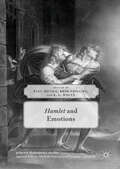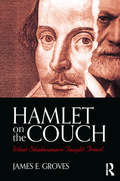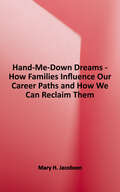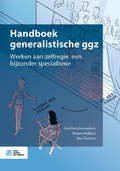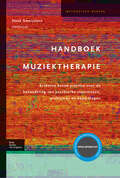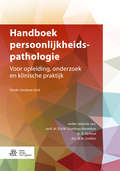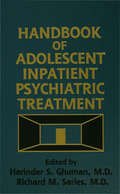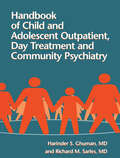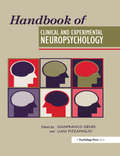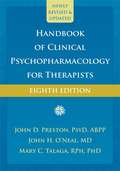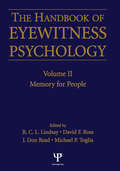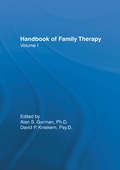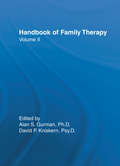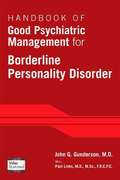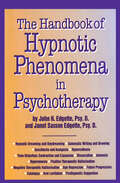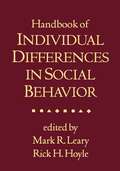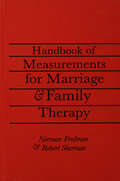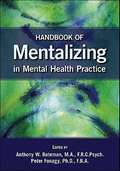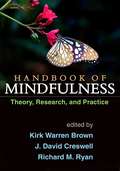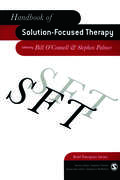- Table View
- List View
Haltung in der Mediation: Die Untersuchung eines unterdefinierten Phänomens (BestMasters)
by Birgit KupiekDieses Buch geht dem Mythos „Haltung“ auf den Grund. Obwohl der altmodische Begriff in Alltag und Wissenschaft allgegenwärtig ist, schlägt die Suche nach einer einheitlichen und fundierten Erklärung fehl. Dieser Widerspruch trifft auch auf die Haltung in der Mediation zu. Die Haltung des Mediators gilt nicht nur als Kern seiner Rollenkompetenz, sie ist umgeben vom Nimbus langjährigen Herrschaftswissens, das vor allem im lukrativen Weiterbildungsmarkt vermittelt wird. Die Arbeit zeigt anhand von Sprache, Alltag, Philosophie und Psychologie die Gesetzmäßigkeiten von Haltung auf und macht sie als historischen Begriff sowie Phänomen begreifbar. Daraus wird ein multiperspektivisches Haltungsmodell für Mediatoren entwickelt, das die Beziehungsgestaltung, neben dem Verfahrensrahmen der Mediation in den Mittelpunkt rückt. Es werden praktische Ansätze aufgezeigt, Haltung in der Selbstreflexion spürbar zu machen und in den Lernprozess als Mediator zu integrieren. Das Buch ist für alle geeignet, die sich mit Konflikten beschäftigen: Mediatoren, Coaches, HR, Führungskräfte.
Hambre: Mi historia frente al espejo
by Toni MejíasHambre es la historia personal en la lucha contra la anorexia de Toni Mejías, reconocido rapero y componente de Los Chikos del Maíz. Un testimonio valiente que enfrenta un tema necesario. Un libro optimista sobre la capacidad de aprendizaje y superación y una crítica a la sociedad de la imagen en la que vivimos. Uno de los síntomas más evidentes de la anorexia es el frío que, como un abrazo de hielo, te atrapa y no te suelta. Hambre es mi historia frente al espejo, una historia escrita desde la derrota, pero llena de pequeñas victorias. Una historia escrita desde la depresión, pero que defiende la alegría como un derecho innegociable. Es mi testimonio acerca de un tema tabú, más aún en el caso de los hombres, y nace con la intención de buscar salidas conjuntas donde otros solo ofrecen muros y derrotas individuales. Toni Mejías, miembro del conocido grupo de rap Los Chikos del Maíz, cuenta la historia de cómo ha sufrido y ha luchado por controlar un trastorno alimenticio como es la anorexia. En él, desgrana su percepción sobre cómo la sociedad, el ritmo de vida, las nuevas tecnologías, la propia autoestima e inseguridad y muchos otros factores pueden tener un papel determinante para que un joven y reconocido artista llegue a sumergirse en el infierno de esta enfermedad. "Es muy valiente lo que has hecho con este libro. Valiente, liberador, terapéutico y generoso". María Rozalén "Digo en una canción que la vida es un regalo y es verdad. Pero también duele, también hay días que son una mierda, también hay épocas que son muy complicadas y que forman parte del proceso". "Necesitaba encontrarme. No en una fotografía donde todos sonreímos, no en un espejo en el que yo construía mis propios monstruos. Necesitaba encontrarme en el reflejo de los demás para saber que seguía existiendo. Para saber que podía volver. Para saber que todavía mucha gente me esperaba. Para saber que, sobre todo, llevaba demasiadas horas esperando regresar. Me lo merecía; se lo merecían. Se lo debía. A ella. A ellos".
Hamlet and Emotions (Palgrave Shakespeare Studies)
by R. S. White Paul Megna Bríd PhillipsThis volume bears potent testimony, not only to the dense complexity of Hamlet’s emotional dynamics, but also to the enduring fascination that audiences, adaptors, and academics have with what may well be Shakespeare’s moodiest play. Its chapters explore emotion in Hamlet, as well as the myriad emotions surrounding Hamlet’s debts to the medieval past, its relationship to the cultural milieu in which it was produced, its celebrated performance history, and its profound impact beyond the early modern era. Its component chapters are not unified by a single methodological approach. Some deal with a single emotion in Hamlet, while others analyse the emotional trajectory of a single character, and still others focus on a given emotional expression (e.g., sighing or crying). Some bring modern methodologies for studying emotion to bear on Hamlet, others explore how Hamlet anticipates modern discourses on emotion, and still others ask how Hamlet itself can complicate and contribute to our current understanding of emotion.
Hamlet in Analysis: Horatio's Story-A Trial of Faith
by Meg Harris WilliamsThis is no mere parody - it is a confession, a treatise, and a very, very clever tragi-farce, which is as funny as it is serious, and serious as it is funny. There is a living, breathing countertransference exploration throughout this fictitious analysis of an all-too-recognizable late-twentieth century young adult, Hamlet Dane, and his alter-ego analyst Dr Horacio. Hamlet in Analysis explores, amongst other things, the cracks and gaps between analytic theory and practice through the candid, private thoughts of our analyst-narrator, whose constantly self-limited philosophy is pierced, rankled, ruptured, and herniated by his young patient, provoking an ongoing challenge to his own sanity. But it contains the best actors in the world, either for tragedy, comedy, history, pastoral, pastoral-comical, historical-pastoral, tragical-historical, tragical-comical-historical-pastoral, scene individable, or poem unlimited
Hamlet on the Couch: What Shakespeare Taught Freud
by James E. GrovesHamlet on the Couch weaves a close reading of Shakespeare’s Hamlet with a large variety of contemporary psychoanalytic and psychological theory, looking at the interplay of ideas between the two. Hamlet can be read almost as a psychoanalytic case study and be used to understand and illustrate a range of core psychoanalytic concepts. Covering such basic psychoanalytic concepts as identity, transference and countertransference, the ‘good-enough’ mother, the compulsion to repeat and the death instinct, James E. Groves shows how Hamlet can shed new light on understanding psychoanalytic theory, and how psychoanalysis can in turn enrich our understanding of Shakespeare’s work. Perhaps the most radical feature of psychoanalysis is its tradition of self-examination. Mirroring it, the book throughout uses an eclectic, subjective critical approach to study how the poetry of Hamlet creates its realistically flawed and believably complex characters. Combining deep, insightful knowledge of Shakespeare and of psychoanalysis, Hamlet on the Couch will be of great interest to psychoanalysts and psychoanalytic psychotherapists, as well as literary scholars.
Hand-Me-Down Dreams: How Families Influence Our Career Paths and How We Can Reclaim Them
by Mary H. JacobsenWe all know that hand-me-downs are often comfortable and easy to put on, but we are rarely happy in something--a jacket or a job--that we didn't choose. If you feel trapped or disappointed in your current career or job, or if you let your family's wishes, rather than your own natural talents, interests, and passions, guide your ultimate career choice, you are living someone else's dream. These "hand-me-down dreams" influence every aspect of our lives, including our work and how we do it. In Hand-Me-Down Dreams, Mary H. Jacobsen's insightful wisdom, culled from her experience as a psychotherapist and career counselor and from her own personal life, illuminates the problems you'll encounter when trying to change this family dynamic. In reading this book and participating in its exercises, you'll be armed with the knowledge you'll need to find the motivation and the courage to fulfill your own dreams and attain success on your terms.
Handboek generalistische ggz: Werken aan zelfregie: een bijzonder specialisme
by Bea Tiemens Giel Hutschemaekers Mirjam NekkersDit handboek laat professionals binnen de generalistische ggz zien hoe ze de zelfregie van patiënten kunnen versterken. In het boek worden wetenschap en praktijk bij elkaar gebracht voor huisartsen, praktijkondersteuners, (GZ-)psychologen, artsen, psychiaters, verpleegkundig specialisten, en hulpverleners in onder meer de eerstelijn gezondheidszorg, de generalistische basis ggz, (algemene) ziekenhuizen en de gehandicaptenzorg. Het boek is gebaseerd op de praktijk van Indigo, een landelijke aanbieder van preventie, POH-ggz en basis ggz. In de generalistische ggz worden klachten primair begrepen als reactie op specifieke biologische, psychologische en sociale uitdagingen in het hier en nu van de patiënt. Kenmerkend is de focus op positieve gezondheid: niet de klachten zijn leidend, maar de oplossingen ervan. Generalistische ggz start bij de vraag wat de patiënt nodig heeft om die oplossing zelf te realiseren. Aan de hand van de oplossing van zijn huidige problemen worden de oplossingsvaardigheden van de patiënt versterkt. Handboek generalistische ggz werkt de generalistische werkwijze voor het eerst systematisch en consequent uit voor ggz-problemen. Allereerst wordt de generalistische werkwijze uitgelegd en vergeleken met de specialistische ggz. Vervolgens wordt de werkwijze in detail beschreven in hoofdstukken over diagnostiek, indicatiestelling, interventies en evaluatie. De auteurs geven veel voorbeelden uit hun eigen praktijk. Hiermee wordt duidelijk hoe zelfregie van de patiënt kan worden versterkt én hoe psychologische theorieën en psychotherapeutische referentiekaders en technieken hierbij gebruikt kunnen worden. Handboek generalistische ggz - Werken aan zelfregie: een bijzonder specialisme is geschreven door Giel Hutschemaekers, hoogleraar geestelijke gezondheidszorg aan de Radboud Universiteit en onder meer hoofd zorgprogramma GBGGZ Indigo-Pro Persona, Mirjam Nekkers, gz-psycholoog-gedragstherapeut werkzaam in de basis ggz, hoofdopleider bij Indigo en docent bij RINO, en Bea Tiemens, hoogleraar Evidence based practice in mental healt care aan de Radboud Universiteit, leider onderzoeksprogramma Indigo en senior onderzoeker bij Pro Persona.
Handboek muziektherapie (Methodisch werken)
by H. SmeijstersInclusief CD met muziekfragmenten Hét standaardwerk voor de muziektherapeut Evidence based practice voor de behandeling van psychische stoornissen, problemen en beperkingen Sinds de verschijning van de eerste editie van het Handboek muziektherapie in 1995 hebben de ontwikkelingen op dit vakgebied elkaar in hoog tempo opgevolgd. Zowel nationaal als internationaal zijn er veel nieuwe praktische en theoretische inzichten ontstaan. Dat heeft geleid tot deze geheel vernieuwde editie van het Handboek muziektherapie.Sinds de verschijning van de eerste editie van het Handboek muziektherapie in 1995 hebben de ontwikkelingen op dit vakgebied elkaar in hoog tempo opgevolgd. Zowel nationaal als internationaal zijn er veel nieuwe praktische en theoretische inzichten ontstaan. Dat heeft geleid tot deze geheel vernieuwde editie van het Handboek muziektherapie.Verscheidene muziektherapeuten, ieder met een specialisatie op het gebied van een bepaalde stoornis of binnen een bepaald werkveld, hebben aan het boek meegewerkt. Deze gebundelde kennis zorgt ervoor dat het Handboek muziektherapie een goed overzicht van theorie, praktijk en onderzoek biedt.Het boek is opgebouwd uit drie delen. Deel I bevat het model van indicatiestelling, gaat in op verschillende vormen van onderzoek en multidisciplinaire richtlijnontwikkeling en geeft een overzicht van theoretische modellen. Deel II heeft betrekking op de methodische kant van de indicatiestelling en bevat hoofdstukken over onder meer receptieve en actieve muziektherapie, doelen en werkvormen. Deel III, ten slotte, vormt de kern van het boek. De eerder behandelde theorie wordt hierin op de praktijk afgestemd. Aan de hand van cases die zijn ontleend aan de eigen praktijk van de auteurs, wordt telkens één stoornis, probleemgebied of werkveldcentraal gesteld.
Handboek ontwikkelingspsychologie: Grondslagen en theorieën
by L. Verhofstadt-Denève P. Geert A. VytDeze vijfde, grondig herziene druk van het Handboek ontwikkelingspsychologie geeft een volledig, geactualiseerd en geïntegreerd overzicht van de belangrijkste theorieën op het gebied van de ontwikkelingspsychologie. Alhoewel het boek is uitgebreid met de meest recente ontwikkelingen op dit vakgebied, blijven de klassieke modellen en onderzoeksgegevens een belangrijke plek innemen. Uitgebreide praktijkvoorbeelden geven het nut weer van de besproken theorieën voor opvoeding, onderwijs, klinisch–therapeutische situaties en interpretatie van dagelijks gedrag.Allereerst worden de uitgangspunten van de ontwikkelingspsychologie als wetenschap besproken. Vervolgens komen de voornaamste actuele stromingen aan bod, met bijzondere aandacht voor hun bijdragen aan de ontwikkelingspsychologie. Doordat deze theorieën vanuit verschillende gezichtspunten besproken worden, wordt duidelijk dat zij elkaar meer aanvullen dan tegenspreken. Het boek wordt afgesloten met een overzichtelijk syntheseschema, waarin de behandelde theorieën kritisch vergelijkend worden samengevat.Het Handboek ontwikkelingspsychologie is niet alleen geschreven voor psychologen en pedagogen in opleiding, maar is ook zeer geschikt als naslagwerk voor afgestudeerden. Om deze reden werd ook een uitgebreid register van kernbegrippen opgenomen. Het boek is geschreven in een stijl die geen expliciete voorkennis van de psychologie vereist, en is daarom ook zeer geschikt voor studenten van andere studierichtingen en de geïnteresseerde leek.
Handboek persoonlijkheidspathologie: Voor opleiding, onderzoek en klinische praktijk
by E.H.M. Eurelings-Bontekoe R. Verheul W. M. SnellenDit welbekende handboek biedt een brede en geïntegreerde kijk op (complexe) persoonlijkheidspathologie en –problematiek en gaat uitvoerig in op diagnostiek en behandeling ervan. Deze geheel herziene derde druk is aangepast aan de nieuwste ontwikkelingen en aan de DSM-5. Er is een hoofdstuk toegevoegd over het in de DSM-5 sectie III opgenomen alternatieve model voor het diagnosticeren van persoonlijkheidspathologie. De gewijzigde visie op 'somatoforme stoornissen' van de DSM-5 is toegevoegd. Daarnaast is er aandacht voor de nieuwste ontwikkeling op het gebied van de netwerk- en symptoomtrajectbenadering van psychopathologie. Aan de orde komen ook neurofysiologische correlaten en de invloed van gen-omgevingstransactie op het ontstaan van persoonlijkheidspathologie. Er wordt ingegaan op de voorlopers van ernstige persoonlijkheidsproblematiek in de vroege ontwikkeling van het kind en de invloed van langdurige vroegkinderlijke negatieve ervaringen op de ontwikkeling van de borderline persoonlijkheidsstoornis. Opnieuw hebben vele experts vanuit uiteenlopende referentiekaders, recente wetenschappelijke bevindingen en inzichten, en diagnostische en behandelmethodieken een bijdrage geleverd aan dit boek. Het is zowel een naslagwerk als praktisch boek voor psychologen, gz-psychologen, klinisch psychologen, psychiaters en zij die daartoe in opleiding zijn.
Handboek studievaardigheden voor het hbo: Activiteiten voor studenten
by Nicolien Van Halem Inge MüllerIn Handboek studievaardigheden voor het hbo staan 74 verschillende leeractiviteiten opgenomen met de daarbij horende werkwijze. Hoe bereid je een project, presentatie, tentamen of een stage voor? Hoe geef je constructieve feedback? Iedere activiteit is uitgewerkt naar inhoud, met een doel en stappenplan. En geeft antwoord op tal van vragen over onder andere samenwerken, studeren en projectmatig werken. Verder krijg je bij het onderdeel Tips adviezen hoe je missers kunt voorkomen en hoe je variatie en diepgang in de activiteit kunt aanbrengen.Het handboek sluit aan bij actuele onderwijsontwikkelingen zoals de inzet van digitale toepassingen en competentiegericht opleiden. Daarnaast is er aandacht voor literatuurstudie en studeren voor een tentamen, maar ook voor werken in een elektronische leeromgeving, onderzoek doen en verzamelen van je portfolio. Individueel leren en samenwerken komen beiden aan bod.Met deze 2e herziene druk leer je op een actieve manier voor je toekomstige beroep. De speciaal voor deze druk ontwikkelde website biedt de daarbij horende digitale en gebruiksvriendelijke ondersteuning. Met alle kwaliteiten die daarvoor nodig zijn: gedegen vakkennis, praktische vaardigheden en een goede beroepshouding. Handboek studievaardigheden voor het hbo is tijdens je hele studie een waardevol hulpmiddel bij het uitvoeren van opdrachten op school en tijdens je stage. Kortom: een onmisbaar naslagwerk!
Handbook Of Adolescent Inpatient Psychiatric Treatment
by Harinder S. Ghuman Richard M. SarlesFirst published in 1994. Routledge is an imprint of Taylor & Francis, an informa company.
Handbook Of Child And Adolescent Outpatient, Day Treatment A
by Harinder S. Ghuman Richard M. SarlesIn the past few years, there has been a major shift in the mental health care of child and adolescents from inpatient care to non-hospital community ambulatory settings. Economic pressures have primarily driven this change in service delivery. Insurance companies and managed care organizations have not only restricted access to hospitalization and limited length of stays but additionally have sharply reduced reimbursements for treatments. State and federal policies for inpatient treatment and reimbursement have followed similar trends. As a result, mental health planners have attempted to develop programs to deal with this trend of restricted inpatient care shifting treatment of children and adolescents to home and community settings. Some of these new programs are well planned and others are hastily planned and implemented. The pitfall to this community approach is that there is a population of chronically disturbed children and adolescents, and highly stressed parents often lacking adequate personal and family resource who may not respond to these new less restrictive, less costly community approaches which potentially may lead to an unsafe and dangerous situation for the child, adolescent, family and the community.With this in mind, the purpose of this book is to provide comprehensive and up-to-date information regarding child and adolescent outpatient, day treatment and community psychiatry. The emphasis of this book is to provide practical knowledge through clinical case illustrations and to explain various strategies in a detailed fashion.
Handbook Of Clinical And Experimental Neuropsychology
by Gianfranco Denes Luigi PizzamiglioThe domain of neuroscience has had one of the most explosive growths in recent decades: within this development there has been a remarkable and renewed interest in the study of the relations between behaviour and the central nervous system. Part of this new attention is connected with the contribution of new technologies (PET, fMRI) permitting more precise mapping of neural structures responsible for cognitive functions and the development of new theoretical models of mental activities.The diffusion of new pathologies (for example the pattern of cognitive impairment associated with AIDS) has further enlarged the field of clinical neuropsychology. Finally there has been an expanding clinical interest in the understanding and management of age-related cognitive changes.This volume is the translated and updated version of the second edition of Manuale di Neuropsicologia (Zanichelli, 1996), by the same authors, and it reflects the current status of the art. It is intended to blend clinical and theoretical aspects of neuropsychology. The first part discusses the instrumental and clinical methods of investigation in neuropsychology, together with their development. A long section is dedicated to the language and memory disorders. The impairment of non-verbal cognitve functions, such as the disorders of space orientation, of of visuo-perceptive abilities, and of the emotions and attention, are extensively discussed. The pattern of degenerative dementias is thorougly described, as e is thoroughly described, as well as a number of new topics, such as a neuropsychological approach to consciousness. Finally, perspectives for treatment of some cognitive disorders are outlined.
Handbook Of Clinical Psychopharmacology For Therapists
by John D. Preston John H. O'Neal Mary C. TalagaThis book is intended primarily for mental health professionals and those in graduate training in psychology, social work, psychiatric nursing, and counseling. The professional goal of most readers will be to provide services that aim to reduce emotional pain, to promote psychological growth and healing
Handbook Of Eyewitness Psychology 2 Volume Set: Memory For Events
by Michael P. Toglia David F. Ross J. Don Read R. C. L. LindsayThe Handbook of Eyewitness Psychology presents a survey of research and legal opinions from international experts on the rapidly expanding scientific literature addressing the accuracy and limitations of eyewitnesses as a source of evidence for the courts. For the first time, extensive reviews of factors influencing witnesses of all ages – children, adults, and the elderly – are compiled in a single pair of volumes. The disparate research currently being conducted in eyewitness memory in psychology, criminal justice, and legal studies is coherently presented in this work. Volume 1 covers memory for events. Volume 2 cover memory for people.
Handbook Of Family Therapy
by Alan S. Gurman David P. KniskernFirst published in 1981. This volume is unique as to date no previous book, and no collection of papers one could assemble from the literature, addresses or achieves for the field of family therapy what is accomplished in this handbook. It responds to a pressing need for a comprehensive source that will enable students, practitioners and researchers to compare and assess critically for themselves an array of major current clinical concepts in family therapy.
Handbook Of Family Therapy
by Alan S. Gurman David P. KniskernThis volume reflects the achievements in developing new concepts and models of family therapy and new approaches to special clinical issues and problems during the 1980s. Chapters by experts such as Boszormenyi-Nagy, Everett, Guttman, Lankton, Liddle, McGoldrick, Madanes, and Walsh offer insight into a variety of areas including systems theory, cybernetics, and epistemology; contextual therapy; Ericksonian therapy; strategic family therapy; treating divorce in family therapy practice; ethnicity and family therapy; and training and supervision in family therapy.
Handbook Of Good Psychiatric Management For Borderline Personality Disorder
by John G. Gunderson Paul S. LinksThe Handbook of Good Psychiatric Management for Borderline Personality Disorder teaches clinicians what to do and how to do it, as well as what not to do and how to avoid it. The author, a renowned researcher and clinician, has developed a new evidence-based treatment, Good Psychiatric Management (GPM) that comfortably utilizes cognitive, behavioral, and psychodynamic interventions that are practical and simple to implement. Because psychoeducation is an important component of GPM, the book teaches clinicians how to educate their patients about BPD, including the role of genetics and the expected course of the disease. This approach offers advantages both to practitioners, who become more adept at honest communication, and to patients, who are encouraged to have realistic hopes and to focus on strategies for coping with BPD in daily life.
Handbook Of Hypnotic Phenomena In Psychotherapy
by Janet Sasson Edgette John H. EdgetteDespite their clinical utility, hypnotic phenomena are vastly underutilized by therapists in their work with patients. Whether this is due to uncertainty about how to use specific techniques constructively or how to elicit particular phenomena, or anxiety about not being able to obtain a desired result, this volume will guide hypnotherapists toward higher levels of clinical expertise. By describing varied hypnotic phenomena and how they can be used as vehicles of intervention, The Phenomenon of Ericksonian Hypnosis takes the therapist beyond these fundamental applications toward a broader, more sophisticated scope of practice. This immensely readable book addresses the selection, eliciting, and therapeutic use of hypnotic phenomena that are natural outgrowths of trance. It offers step?by?step instruction on eliciting age progression, hypnotic dreaming, hypnotic deafness, anethesia, negative and positive hallucination, hypermnesia, catalepsy, and other hypnotic phenomena. The book includes specific instruction on how to use the phenomena manifested in trance to provide more effective treatment. Numerous case examples vividly illustrate intervention with anxiety disorders, trauma and abuse, dissociative disorders, depression, marital and family problems, sports and creative performance, pain, hypersensitivity to sound, psychotic symptomatology, and other conditions. The Phenomenon of Ericksonian Hypnosis will be used by therapists as a valuable clinical tool to expand their conceptualizations of hypnosis, and thus enable them to offer a wider repertoire of skills with which they can confidently treat clients.
Handbook Of Individual Differences In Social Behavior
by Mark R. Leary Rick H. HoyleHow do individual differences interact with situational factors to shape social behavior? Are people with certain traits more likely to form lasting marriages; experience test-taking anxiety; break the law; feel optimistic about the future? This handbook provides a comprehensive, authoritative examination of the full range of personality variables associated with interpersonal judgment, behavior, and emotion. The contributors are acknowledged experts who have conducted influential research on the constructs they address. Chapters discuss how each personality attribute is conceptualized and assessed, review the strengths and limitations of available measures (including child and adolescent measures, when available), present important findings related to social behavior, and identify directions for future study.
Handbook Of Measurements For Marriage And Family Therapy
by Robert Sherman, Ed.D. Norman Fredman, Ph.D.Published in 1987, Handbook of Measurements For Marriage And Family Therapy is a valuable contribution to the field of Family Therapy. The purpose of this handbook is to provide a single convenient source to which practitioners, researchers, and trainees can turn in order to learn how to use marriage and family instruments and to find descriptions of instruments suited to their needs.
Handbook Of Mentalizing In Mental Health Practice
by Peter Fonagy Anthony W. BatemanMentalization-based therapy is a specific type of psychotherapy designed to help people consider their own thoughts and feelings and differentiate them from the perspectives of others. The editors are the foremost experts on mentalizing, having published two previous books and a multitude of scholarly papers defining it and describing its multiple clinical applications. Handbook of Mentalizing in Mental Health Practice is by far the most cutting-edge, comprehensive source of information and instruction on this critical therapeutic technique, with everything clinicians need to know to integrate mentalizing into their therapeutic repertoire. The editors maintain that the aim of mentalizing therapy is to enhance a mentalizing process, regardless of the context in which it is being delivered. Thus, while most often employed in individual therapy, it can also be useful in group and family therapy situations. Similarly, it may prove equally effective in inpatient and outpatient contexts, and in standard and brief therapy modes. What is critical is the therapist's focus on the patient's "mind-mindedness" as it applies to his or her subjective experience of reality and to awareness of other people's perspectives. Here are some of the key observations made in this fascinating book: * Evidence suggests that people who have been diagnosed with a personality disorder may have specific deficits in mentalizing in the context of attachment relationships, and that this group transcends the classification of borderline personality disorder (BPD), which the authors had previously identified with such deficits. This has profound implications for treatment of all types of personality disorders. * The authors now see mentalizing as a developmental construct that is extended to the family and throughout an individual's development. This insight suggests that intervention -- and even prevention of deficits -- may be possible. * Because mentalizing is a fundamental psychological process, it interfaces with all major mental disorders. This means that mentalizing techniques may have the potential to improve well-being across a range of disorders, including depression, eating disorders, addiction, and even the less severe forms of antisocial personality disorder. * Adolescence, the phase of development where personality disorder, depression, eating disorders, substance abuse, and other disorders first emerge, is a critical period for identification of mentalizing deficits and the time when intervention can do enormous good. These insights are tremendously useful for any practitioner of psychotherapy, as well as students in the field. Exhaustive in its coverage of the nature, practice, and exciting potential of this relatively new approach, Handbook of Mentalizing in Mental Health Practice is destined to become a classic in the literature of psychotherapy.
Handbook Of Mindfulness: Theory, Research, And Practice
by Richard Ryan Kirk Brown J. CreswellAn authoritative handbook, this volume offers both a comprehensive review of the current science of mindfulness and a guide to its ongoing evolution. Leading scholars explore mindfulness in the context of contemporary psychological theories of attention, perceptual processing, motivation, and behavior, as well as within a rich cross-disciplinary dialogue with the contemplative traditions. After surveying basic research from neurobiological, cognitive, emotional/affective, and interpersonal perspectives, the book delves into applications of mindfulness practice in healthy and clinical populations, reviewing a growing evidence base. Examined are interventions for behavioral and emotion dysregulation disorders, depression, anxiety, and addictions, and for physical health conditions.
Handbook Of Solution-Focused Therapy
by Stephen Palmer Bill O'ConnellOn a scale of 0-10 I would give the Handbook of Solution Focused Therapy a nine - it met my best hopes in terms of an insight into the theory and mechanics of SFT, and gave me ideas for extending my current use of the therapy. I found it engaging, readable and well-presented, with useful reference lists within each chapter to guide further reading' - Solution News `This collection of fifteen chapters, each written by a different specialist in the SFT field, is a valuable contribution to the Solution-Focused therapist's bookshelf. A must-read for any informed SF therapy practitioner - Mark McKergow, The Solutions Focus `This book has 14 chapters on diverse applications of Solution-Focus, between introductory and closing chapters by Bill O'Connell. The book relates to work being done in the UK and in Ireland, excepting Alasdair MacDonald's piece on research in SFT, which is an up-to-date and welcome review of research findings world-wide. All the chapters are succinct and they convey a clear impression of the lightness and excitement of this approach, for service-users and therapists alike. The book is a good read for any therapist, professional helper or service manager' - Robert Cumming , Nurturing Potential Solution-Focused therapy is an increasingly popular approach, used by practitioners in a wide range of contexts and settings. Illustrating the breadth and depth of contemporary practice, the Handbook of Solution-Focused Therapy brings together contributions from leading practitioners in fields such as social work, education and health care to show how solution-focused techniques can be effective in many different situations. Beginning with an introduction to the origins and theory of the approach, the book examines different areas of practice, explaining how and why the solution-focused approach is applicable and highlighting the issues specific to each context. Each chapter features a case-example, which demonstrates the practical advantages and difficulties, involved in using the solution-focused approach. The Handbook of Solution-Focused Therapy is an ideal text for training courses in solution-focused therapy and a source of new ideas for practitioners trained in other approaches who want to integrate solution-focused techniques with their existing practice. Bill O'Connell is a Senior Lecturer in Counselling at University of Birmingham and author of Solution-Focused Therapy (SAGE 1998) and Solution-Focused Stress Counselling (Continuum 2001). Professor Stephen Palmer is Director of the Centre for Stress Management and the Centre for Coaching, London. He has written and edited over 25 books.


